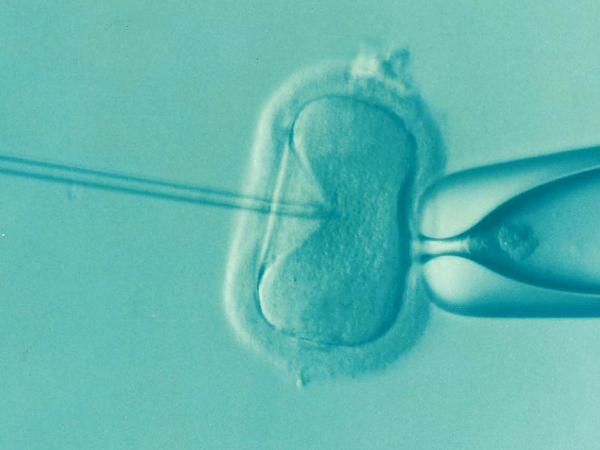ICSI and PICSI: Advanced Solutions for Infertility Treatment
Giving couples the best chance to conceive
What is ICSI and PICSI?
ICSI (Intracytoplasmic Sperm Injection) and PICSI (Physiological Intracytoplasmic Sperm Injection) are advanced assisted reproductive technologies used alongside IVF to enhance fertilization, especially in cases of severe male infertility. ICSI involves the direct injection of a single, high-quality sperm into a mature egg, bypassing natural fertilization barriers. This technique is highly effective for couples facing low sperm count, poor motility, abnormal morphology, or previous IVF failures. PICSI takes this a step further by using a hyaluronan gel to mimic the natural egg environment, allowing embryologists to select only mature, genetically competent sperm for fertilization. This process improves embryo quality and reduces the risk of miscarriage.
At Bud IVF, we leverage both ICSI and PICSI with precision, ensuring the best possible outcomes for our patients. Our expert fertility specialists customize treatments to suit your needs, helping you take a confident step toward parenthood.

What is ICSI?
How Does ICSI Work?
What is PICSI?
How Does PICSI Work?
Whether you are facing one or multiple challenges, Bud IVF is here to guide you with personalized care and expert solutions tailored to your unique needs.
Who Should Choose ICSI and PICSI?
Severe Male Infertility
Low sperm count, poor motility, or abnormal morphology.
Fertilization Failure
Unsuccessful fertilization in previous IVF cycles.
Azoospermia
Absence of sperm in the ejaculate, requiring surgical sperm retrieval (PESA, TESA, or Micro-TESE).
Unexplained Infertility
Cases where no clear cause of infertility has been identified, but natural fertilization fails.

Why Choose Bud IVF for ICSI and PICSI?
Proven Track Record
With success rates of 60-80% for ICSI and PICSI, our outcomes are among the best in the industry.

Experienced Specialists
Our skilled embryologists and fertility experts bring years of expertise to every procedure.

State-of-the-Art Facility
We use cutting-edge technology for sperm selection, embryo culture, and transfer, ensuring precision at every step.
Comprehensive Support
From pre-treatment counseling to post-procedure care, we support you throughout your journey.
Tailored Treatment Plans
We design personalized protocols to meet your unique fertility needs.
Take the first step toward building your family by booking a consultation at Bud IVF today!
Success Rates & Factors That Affect ICSI and PICSI Success
At Bud IVF, we ensure precise ovarian stimulation to retrieve the best possible eggs. High-quality eggs are crucial for the fertilization process and the development of healthy embryos.
Women under the age of 35 typically have better egg quality, leading to higher success rates.
For ICSI, a morphologically normal sperm with good motility is selected manually.
PICSI further enhances success by selecting the most mature and genetically stable sperm using hyaluronic acid binding. This careful selection reduces the chances of chromosomal abnormalities in embryos.
Age is one of the most significant factors affecting success. Women under 35 have higher chances of success, while success rates decline gradually for women over 40 due to diminished ovarian reserve and egg quality.
We provide tailored protocols to optimize outcomes for women in different age groups.
Conditions like endometriosis, PCOS, or uterine abnormalities can impact implantation and pregnancy success.
We conduct thorough evaluations and offer additional treatments to manage these conditions before proceeding with ICSI or PICSI.
Healthy lifestyle choices play a significant role in improving success rates. Factors like a balanced diet, regular exercise, and avoiding smoking or excessive alcohol consumption contribute to better outcomes.
Couples are advised to focus on stress management, as high stress levels can negatively impact fertility.
The quality of the resulting embryos significantly affects implantation rates.
We employ advanced embryo culture techniques to select the most viable embryos for transfer, ensuring a higher likelihood of success.
The success of ICSI and PICSI heavily depends on the skill of the embryologists and the technology used.
Bud IVF is equipped with state-of-the-art laboratories and a team of experienced embryologists who meticulously handle every step of the process.
The number of embryos transferred influences success rates. Transferring multiple embryos can increase the likelihood of pregnancy but may also raise the risk of multiple pregnancies.
At Bud IVF, we follow ISAR guidelines to ensure the best balance between success and safety.
A woman’s overall health, including her hormonal balance and uterine receptivity, significantly influences the success of implantation.
We provide pre-treatment assessments to address any hormonal or uterine issues, optimizing the conditions for a successful pregnancy.
FAQs
In conventional IVF, eggs and sperm are mixed in a lab dish to allow fertilization to occur naturally. In ICSI (Intracytoplasmic Sperm Injection), a single sperm is directly injected into the egg, making it an effective solution for severe male infertility issues.
PICSI (Physiological Intracytoplasmic Sperm Injection) selects the most mature and healthy sperm using a special binding test before injecting it into the egg. This additional step enhances the chances of successful fertilization and embryo quality compared to traditional ICSI.
Couples with severe male infertility factors, such as low sperm count, poor motility, or abnormal morphology, are ideal candidates. PICSI is particularly beneficial for men with high DNA fragmentation in their sperm.
The success rate for ICSI typically ranges between 50-80% for fertilization, while PICSI may further improve embryo quality and implantation rates. However, overall success also depends on factors like egg quality and the woman’s age.
While ICSI and PICSI are safe procedures, there is a small risk of damage to eggs during injection. At Bud IVF, we employ advanced techniques and experienced embryologists to minimize risks and ensure optimal outcomes.
